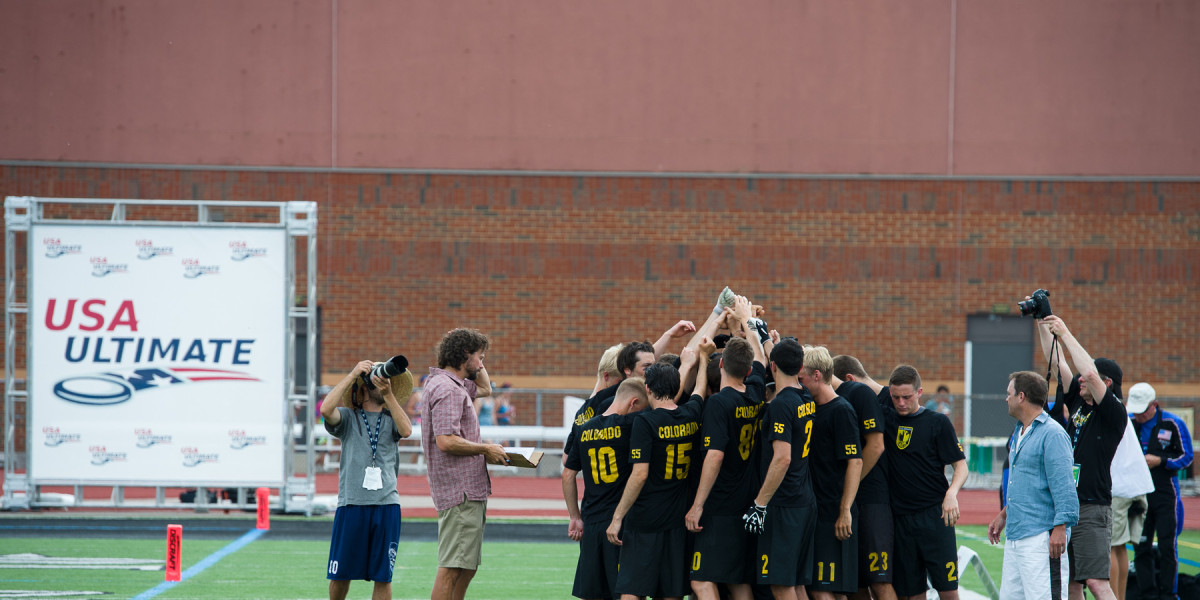 UltiPhotos.com" />
Kevin Leclaire - UltiPhotos.com
UltiPhotos.com" />
Kevin Leclaire - UltiPhotos.com
Mamabird winning the national championship brought truth to wisdom I once thought was rubbish. This rubbish turned gold was mined from the dredges of a person I once called coach. Coach Cat to be exact.
Before I go on, let me set the stage. It’s a decade ago, Jimmy Mickle is a 13 year-old pint-sized lad who is just beginning to think maybe girls didn’t actually have cooties, his favorite food is a milkshake and his favorite song is Milkshake by Kelis– he thinks the song is about his beloved iced beverage. I am a 21 year-old boy running around Colorado’s campus flirting with every cute girl who, no matter the temperature, would be wearing the mandatory UGG boots and miniskirt (a fashion statement that failed to account for any actual grip, which often resulted in exposed skin meeting cold ice, much to the amusement of all observers). Besides chasing the finer things in life, I pursued national championships with Mamabird under the watchful eye of man called Catt Wilson. Catt and I had many conversations, some intelligent, some incoherent, some just to get the minutes to move by.
There was one conversation we had happened a couple times a year, and it would go a little something like this:
“Catt, why don’t we just play all the good players all the time and cut all the players who aren’t good.”
“Because we are making a program, not just a bunch of good players.”
“Yeah, but we could win more games. Florida does it, why can’t we?” At the time, Florida was known for playing only a few players and doing quite well. Catt would always respond the same way.
“Florida may be good while their good players are there, but once they graduate, those same good players will leave nothing behind. They will leave their program with nothing because they only invested in themselves. We are part of a program that will continue long after you are gone.”
During my time as a young whippersnapper, this was hard to hear and even harder to abide by. However, Catt was right: I left CU Mamabird and Mamabird kept playing well. Cat even left, replaced by a coach with a similar mindset, and CU kept on playing well. Now, an entire decade later, a team that shares the same values wins a national championship.
Over the years I have learned the importance of creating a good program, not just a good team. I am lucky enough to play on a team like Revolver who shares in this understanding. An interesting question that has yet to be seen is whether pro ultimate will be able to do this or whether the introduction of money will lead to constant turnover based on skill alone. I love the commitment that Revolver makes to getting the best from old players while passing on the reigns to new players as soon as they make the team. Roster spots can sometimes be given to players with less initial skill, simply because the leadership trusts the system to craft solid players who show potential into great ones.
I am not saying that throwing together a bunch of great players from the woodworks can’t work– look at Doublewide a couple years ago– but I would argue that on the flip side, you suffer later down the road for selling your soul for instant success. I am not exactly sure of the fate of Doublewide this year, but it sounds a bit tumultuous from the rumors that I’ve heard. Did they lose their identity at the righteous price of gold medal? Only time will tell.
Playing in the MLU and the AUDL on their virgin West Coast quests has shown me that the biggest difference between club and pro is the team identity and culture. Like a lot of pro ultimate teams. the Spiders are just a bunch of players thrown together. I think if any pro team wants to be successful for the long haul, they should start thinking about what goes into a successful organization and structuring strong program rather than just putting together a team that can be good for one year.
Before I sign off, I would like to mention I think coach Catt was wrong on one thing he constantly preached to me: “Go one hundred percent all the time.”
I think some players can do this. I cannot. My sly sloth technique has been built over the years and is the opposite of what Catt wanted. While it would take many years in the dojo to teach the subtleties of the sloth southpaw, the secret is based on never showing 100 percent 90 percent of the time.
I am still waiting to hear back from the commissioner of the AUDL about changes to the game. I think he may have de-friended me on Facebook after my last blog post. I will notify you all when contact is reached. This week’s question is difficult: “How do you create a successful program that will last?” The winning answer will be selected by Matty, the guru behind the highly successful Fury program.









Comments Policy: At Skyd, we value all legitimate contributions to the discussion of ultimate. However, please ensure your input is respectful. Hateful, slanderous, or disrespectful comments will be deleted. For grammatical, factual, and typographic errors, instead of leaving a comment, please e-mail our editors directly at editors [at] skydmagazine.com.